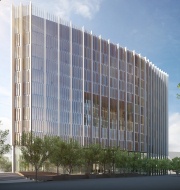29 July 2014
 The University of South Australia has received strong support for its forthcoming public science studio from one of Adelaide’s most loved visitor experiences – the Investigator Science and Technology Centre.
The University of South Australia has received strong support for its forthcoming public science studio from one of Adelaide’s most loved visitor experiences – the Investigator Science and Technology Centre.
Designed to transform public perceptions of science, technology and innovation, the Science l Creativity l Education Studio (SciCEd) will provide an interactive space for visitors to explore the wonders of science.
UniSA students will have the chance to play an important part in the SciCEd visitor experience, working as student interpreters who are on hand to make sure visitors get the most out of the cutting-edge displays and exhibitions.
The Investigator Science and Technology Centre, which ceased operations in 2006, is making a substantial donation of its residual assets to support the student interpreters program, providing the means for UniSA students to act as Investigator Science and Technology Interpreters.
UniSA Vice Chancellor Professor David Lloyd says SciCEd’s mission to open minds, inform debate and bring people together in a place where science, creativity and education collide, embodies many of the original aims of the Investigator Science and Technology Centre and the University is delighted to have the Centre’s support.
“I’m pleased we have received support of the Investigator Science and Technology Centre because of its strong history in promoting science and innovation,” Prof Lloyd says.
“We are eager to preserve the legacy and outreach objectives established by the Centre during its 15-year period as the State’s premier science education centre.
“By highlighting the strong links that exist between science, the arts and business disciplines, SciCEd will be a space designed to ignite a passion for science, technology and innovation.
“Bringing science and technology out of the labs and into the public realm can also play an important role in helping young people find that spark and drive to pursue careers in science and innovation.
“This is becoming increasingly important as we witness a decline in the number of students interested in studying science, technology, mathematics or engineering (STEM) across the globe. In Australia, we have seen a significant drop in Year 12 students enrolling in science subjects – the number of students taking physics for example fell by 31 per cent from 1992 to 2009.
“As we move to a technology-based, innovation-dependent economy, the demand for these skills is greater than ever before so it is vital that we do everything we can to excite a passion for science and technology, especially in young people.”
Chairman of the Investigator Science and Technology Centre board, Mike Hannell says the Centre welcomes the opportunity to contribute to SciCEd’s outreach and public engagement activities.
“Through SciCEd, the aspirations of the Investigator Science and Technology Centre will live on and continue to benefit new generations of South Australians as they explore science and technology in an engaging and interactive way,” Hannell says.
“The student interpreters will enhance the visitor experience by encouraging active participation in science and technology. They will also provide an important human connection to the science and research that is taking place at the University and in the wider community.
“UniSA students will also benefit from the program, gaining valuable experience in public engagement and science communications while completing an internship as part of their degree.”
SciCED will be located in a purpose-built facility integrated into UniSA’s Health Innovation building on North Terrace Health and Biomedical Precinct. Set to open late in 2017, plans for the facility include exhibition spaces, studios, a science café and science shop, collocated with the Hewlett Packard Innovation Centre.
Key partners involved in the SciCED initiative include Foundation Technology Partner, Hewlett Packard, the Science Gallery International, RiAus, and Questacon.
Media Contact: Michèle Nardelli office: 08 8302 0966 mobile: 0418 823 673 email: Michele.nardelli@unisa.edu.au



